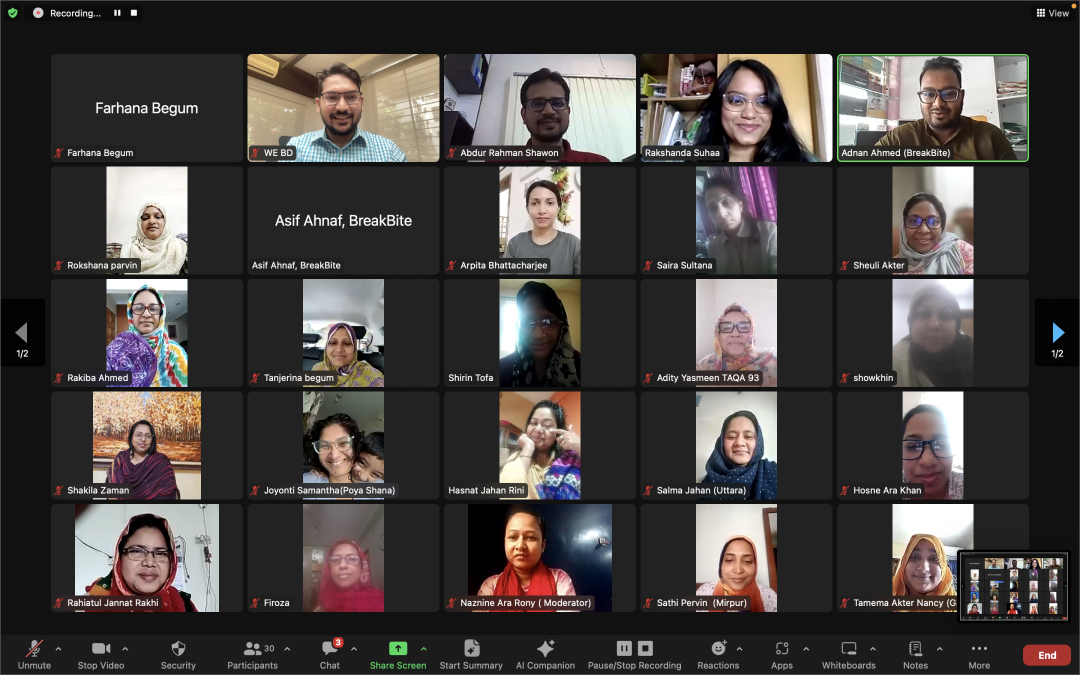
by BreakBite Editorial Wing | May 28, 2024 | WSME Business Insights
Successful Online Q&A Session on Customer Support & Communication
Date: May 28, 2024
Time: 12:00 PM, Dhaka
The Women Entrepreneurs Business Support Center, a key initiative under the We-Fi project of the World Bank, successfully hosted an enlightening online Q&A session on Customer Support & Communication on May 28, 2024. The session, led by Abdur Rahman Shawon, Founder and CEO of Pendulum Motion, provided invaluable insights and strategies aimed at enhancing the customer service practices of women entrepreneurs.
Speaker:
Abdur Rahman Shawon, Founder & CEO, Pendulum Motion
The discussion began with Abdur Rahman Shawon sharing his journey of establishing a customer service business. He emphasized the critical importance of understanding what “customer” and “service” truly mean. Shawon prompted participants to reflect on their interpretations, setting the stage for a deeper exploration of effective customer service strategies.
Key discussion points included:
- Customer Service Strategy: Shawon explained that a robust customer service strategy is essential for any business aiming for long-term success. He discussed the importance of having clear protocols and procedures in place to handle customer interactions efficiently.
- Customer Behavior: Understanding customer behavior is crucial for providing tailored support. Shawon highlighted techniques to read and respond to customer needs, emphasizing empathy and active listening.
- Necessity of Loyal Customers: Shawon underscored the value of loyal customers, explaining how they can become brand advocates. He shared strategies to cultivate loyalty through consistent, high-quality service and personalized engagement.
- Turning Negative Experiences into Positive Ones: Shawon provided actionable steps to transform a negative customer experience into a positive one. He stressed the importance of quick resolution and genuine apologies, which can often turn a dissatisfied customer into a loyal one.
- The Principle that “Customer is Always Right”: Shawon elaborated on this principle, explaining that while it may not always be literally true, treating customers with utmost respect and consideration can significantly enhance their experience.
- Adding Extra Value: Shawon discussed ways to add extra value to the customer experience, such as through personalized follow-ups, exclusive offers, and thoughtful gestures that exceed expectations.
The session was highly interactive, with several women entrepreneurs actively participating and sharing their experiences.
Shimul Mojlish (Rupban):
Business: Hand Painting & Rickshaw Painting
Issue: Providing extra gifts to customers to add value.
Discussion Points: Shawon advised that gifts are not always valuable. He emphasized the importance of understanding the customer’s mind and providing what they truly value, rather than generic gifts.
Hasna Jahan Rini (Agro Product):
Business: Desi Masala
Discussion Points: Rini shared her approach to customer engagement and the strategic use of gifts based on purchase history. Shawon commended her personalized approach and suggested refining it based on customer feedback.
Farhana:
Issue: Feeling shy to repeatedly reach out to customers for advertising products.
Discussion Points: Shawon addressed her concerns, highlighting that overcoming hesitation is crucial. He suggested appointing a representative if she feels uncomfortable, ensuring that customer engagement remains consistent.
Sathi Parvin (Shopno Ghuri Lifestyle):
Business: Bedsheets
Discussion Points: Parvin shared her success in using Facebook business groups for customer support. Shawon encouraged her to continue leveraging social media and to keep learning and adapting her strategies.
Shawon also shared insights from his experiences in the Western business world, where employees handling customers often sign documents committing to the principle that “Customer is always right.” He explained that this mindset fosters a culture of respect and attentiveness towards customers, which is crucial for business success.
During the session, Shawon highlighted a few effective stress management strategies, such as maintaining a daily schedule with planning apps or calendars, which can significantly reduce feelings of being overwhelmed and improve overall well-being.
The session concluded with an engaging Q&A where Shawon addressed various issues affecting women entrepreneurs, providing tailored advice and actionable strategies. This session highlighted the critical role of effective customer support and communication in building a successful business.
The Women Entrepreneurs Business Support Center remains committed to empowering women entrepreneurs through such valuable learning opportunities, fostering a supportive community for their growth and success.
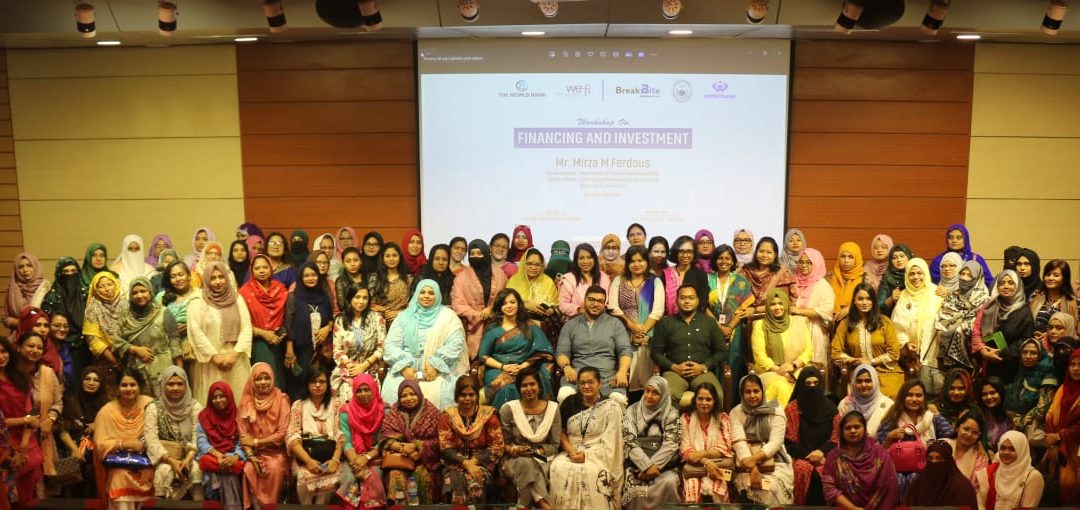
by BreakBite Editorial Wing | May 2, 2024 | WSME Business Insights
Empowering Women Entrepreneurs: Successful 5th Physical Workshop on Financing and Investment at NSU Campus
Date: May 2, 2024
Time: 10:30 AM
Location: North South University Campus
The Women Entrepreneurs Business Support Center, a pivotal initiative under the We-Fi project of the World Bank and organized by BreakBite in collaboration with North South University, successfully conducted its 5th physical workshop on Financing and Investment on May 2, 2024, at the NSU Campus. The workshop, led by Mr. Mirza M Ferdous, Senior Lecturer in the Department of Finance & Accounting at NSU, attracted over 120 women entrepreneurs eager to enhance their financial acumen.

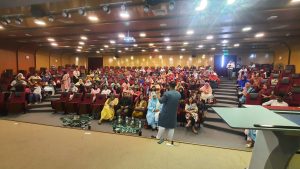
The primary objective of the workshop was to address questions submitted by the participants. The organizers carefully filtered, combined, and rephrased these queries into seven broad questions covering various aspects of financial management. A secondary goal was to respond to any additional questions from the audience at the end of the presentation.
The workshop began with a concise yet comprehensive overview of financial management, breaking it down into three functional areas: operations, investments, and financing. Given the workshop’s time constraints and scope, it was emphasized that the main focus would be on the subject of “risk.”
Understanding Risk: Risk was redefined not as a negative concept associated with loss, but as the idea of uncertainty, described mathematically as “we don’t know exactly what will happen in the future.” This concept of risk was a recurring theme throughout the workshop, with various facets of risk and risk management discussed in detail.
Detailed Q&A Session:
- Current Financial Trends: The first question addressed current trends in the financial and investment landscape, emphasizing the need for digitization. The discussion highlighted the importance of maintaining clear digital records for businesses to be eligible for financing opportunities, detailing the steps towards achieving digitization.
- Capital Structure and Cash Flow Optimization: The second and third questions focused on capital structure and cash flow optimization. The relationship between enterprise value, equity, and debt was explained, followed by an in-depth overview of cash flow management.
- Sources of Funding: The fourth question explored various sources of funding, highlighting their characteristics and pointing out unreliable sources to avoid, such as “shomobai shomities.” The significance of digitization and structured record-keeping was reiterated.
- KPIs and Financial Health: The fifth question, primarily academic, dealt with key performance indicators (KPIs) for measuring a business’s financial health. The discussion centered around the cash conversion cycle, cash ratio, and revenue growth, making it easy for the audience to grasp.
- Risk and Exit Strategies: The last two questions involved a detailed discussion on risk and exit strategies. Revisiting the concept of risk, the workshop drew connections between uncertainty and all the questions addressed.
The workshop saw active participation from the audience throughout, with the speaker encouraging questions. The Q&A session extended beyond the workshop, with participants seeking investment advice, clarifications on business structures, and discussions on various savings instruments. The workshop was engaging, beneficial, and well-received by all participants, providing valuable insights into financial management and fostering a deeper understanding of risk and its implications.
The Women Entrepreneurs Business Support Center, supported by BreakBite, continues to play a crucial role in helping women navigate the complexities of financial management and investment, equipping them with the knowledge and skills needed for sustainable growth.
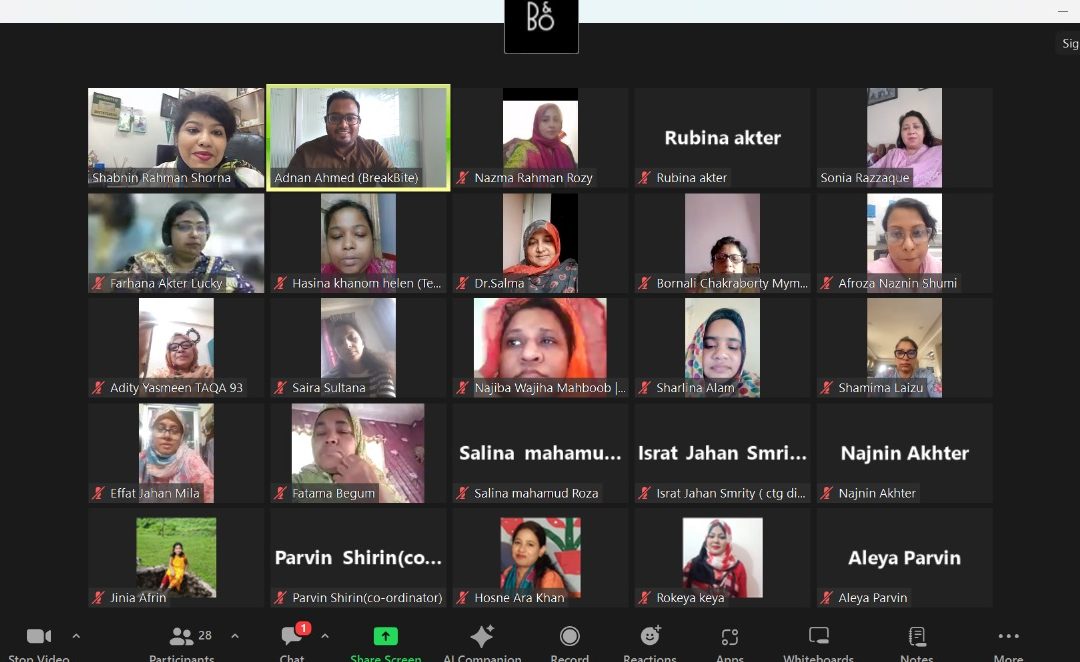
by BreakBite Editorial Wing | Apr 27, 2024 | WSME Business Insights
Empowering Women Entrepreneurs: Successful Online Q&A Webinar on HR Strategy by WSME Business Support Center
Date: April 27, 2024
Time: 1:00 PM to 2:15 PM
Mentor: Shabnin Rahman, Senior Lecturer, Department of Management, NSU
The Women Entrepreneurs Business Support Center, a key initiative under the We-Fi project of the World Bank, successfully hosted an enlightening online Q&A webinar on HR Strategy on April 27, 2024. The webinar was led by Shabnin Rahman, Senior Lecturer in the Department of Management at North South University, and focused on innovative human resource strategies for small and medium-sized enterprises (SMEs).
In her opening statement, Shabnin Rahman highlighted the financial hardships commonly faced by SMEs, which often hinder their ability to invest in attractive HR strategies. However, she emphasized that SMEs could implement effective HR strategies without incurring significant expenses. The webinar covered crucial HR topics, including:
- Hiring Strategy
- Training and Development Strategy
- Retention
- Employees’ Expected Behavior & Ethical Issues
The discussion was highly interactive, with many women entrepreneurs sharing their experiences and plans for managing and utilizing their workforce. Rahman provided practical examples and insights, illustrating how SMEs can adopt HR strategies without a designated budget.
Hiring Strategy: Rahman explained that hiring can be done cost-effectively. She suggested leveraging networks to search for employees, offering incentives to team members, and instituting a “day in the life” program to assess candidates’ passion for the job. Ms. Shahina agreed, noting that entrepreneurs could indeed hire without significant expenses by following these strategies.
Training and Development: Due to financial constraints, women entrepreneurs often cannot hire expert workers and must train their employees from the ground up. Rahman emphasized the importance of a proper training and development strategy, especially when the business is on the verge of expanding and introducing new products.
Retention: Entrepreneurs expressed concerns about retaining employees after investing in their training, as trained workers often leave for better-paying jobs or start their own businesses. Rahman offered several key points to enhance employee retention:
- Make workers feel connected to the business.
- Ensure employees feel like an essential part of the team.
- Foster a team-oriented environment without hierarchical barriers.
- Always pay employees on time and maintain a safe, healthy working environment.
- Provide small perks, such as free beverages and occasional team meals.
- Offer moral support and reasonable financial advances when needed.
Ethical Issues: Rahman addressed concerns about employees engaging in unethical practices, such as sharing product designs and sensitive business information. She advised dealing with such issues professionally by terminating unethical employees promptly and ensuring that employees do not feel indispensable.
During the webinar, Rahman shared insights from the Western business world, where employees handling customers sign documents committing to the principle that “Customer is always right.” This practice fosters a culture of respect and attentiveness towards customers, which many participating entrepreneurs found valuable.
The session was highly productive, providing women entrepreneurs with practical HR strategies and fostering a deeper understanding of effective workforce management. The Women Entrepreneurs Business Support Center continues to empower women entrepreneurs by offering valuable resources and insights through such webinars.
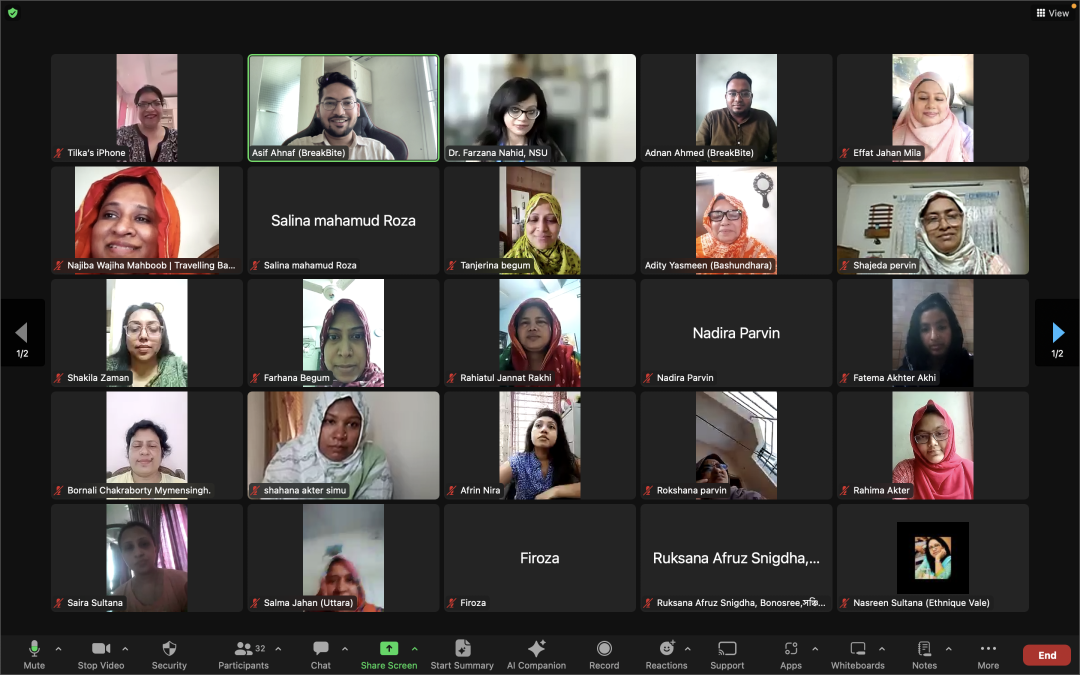
by BreakBite Editorial Wing | Apr 20, 2024 | WSME Business Insights
Empowering Women Entrepreneurs: In-Depth Online Q&A Session on Business Growth Strategy by WSME Business Support Center
Date: April 20, 2024
Time: 11:00 AM to 12:00 PM
Mentor: Tilka Farzana, Lecturer, Department of Marketing, NSU & Partner, Wed Window
The Women Entrepreneurs Business Support Center, a key initiative under the We-Fi project of the World Bank and organized by BreakBite in collaboration with North South University, successfully hosted a comprehensive online Q&A session on Business Growth Strategy on April 20, 2024. The session, led by Tilka Farzana, Lecturer in the Department of Marketing at North South University and Partner at Wed Window, provided invaluable insights into strategic business growth for women entrepreneurs.
Tilka Farzana began the discussion by sharing her inspiring journey of starting her own café, The Red Window Gulshan. She narrated how she nurtured her dreams and turned them into reality, emphasizing the importance of following one’s dreams and passion, listening to one’s heart, holding on to dreams, and nurturing them to grow. Farzana encouraged the participants with the mantra: “Never give up… start & restart!”
The session covered several critical growth strategies, including:
1. Market Penetration: Farzana discussed ways to increase market share within existing markets through competitive pricing, marketing efforts, and customer loyalty programs. She emphasized the importance of understanding customer needs and delivering consistent value.
2. Product Development: Strategies for innovating and improving products were highlighted. Farzana stressed the need for continuous research and development to meet evolving customer preferences and stay ahead of competitors.
3. Market Development: Exploring new markets and customer segments was a key focus. Farzana advised on identifying potential markets and tailoring products and marketing strategies to suit the new audience.
4. Diversification: The importance of diversifying product lines and services to spread risk and create new revenue streams was discussed. Farzana shared examples of successful diversification strategies.
5. Target Market Identification: Farzana explained how to effectively identify and target specific customer segments. She underscored the importance of market research and data analysis in crafting targeted marketing campaigns.
6. Value Proposition: Crafting a compelling value proposition that differentiates the business from competitors was a critical discussion point. Farzana highlighted the elements of a strong value proposition, including unique benefits and competitive advantages.
7. Team Building: Building and nurturing a strong team was emphasized as a cornerstone of business growth. Farzana shared strategies for recruiting, training, and retaining talented employees, even with limited resources.
8. Investment Options: Various investment options for business expansion were explored. Farzana discussed the pros and cons of different financing methods, including bootstrapping, venture capital, and loans.
9. Cost Leadership: Strategies for achieving cost leadership through efficient operations and cost-effective resource management were covered. Farzana explained how maintaining low costs can provide a competitive edge.
10. Cross-Selling: The benefits of cross-selling related products and services to existing customers were discussed. Farzana provided practical tips for implementing cross-selling strategies to increase revenue.
An intensive discussion took place with several women entrepreneurs who shared their experiences and challenges:
Rosy (Nurjahan Begum):
Business: Sharee Baksho & Panchfuron – Ma er ranna recipe
Issues: Time management, delivery issues, and products easily copied by competitors
Discussion: Strategies for team building, resource utilization, cloud kitchen investments, funding, and budgeting were explored.
Yasmin Sultana – Jessore:
Business: Nandonik Shomahar & Nandonik Bhoj
Issues: Challenges with the business model
Discussion: Focused on refining and improving the business model for better efficiency.
Bornali Chakraborty – Mymensingh:
Business: Bornali’s Cuisine
Issues: Large market size, need for resources, and team building
Discussion: Addressed strategies for acquiring resources and building an effective team.
Roksana Parvin – Pabna:
Business: Roksana r ranna r Moshla
Issues: BSTI issues and cross-border e-commerce
Discussion: Solutions for compliance with BSTI regulations and expanding into cross-border markets.
Rahaitul Jannat Rakhi:
Business: Girly Boutique – Maslin products
Issues: Slow sales progress, high production costs, pricing challenges, payment methods, quality of clothes, branding
Discussion: Strategies for improving sales, reducing costs, effective pricing, and enhancing branding.
Aditya Yasmin:
Business: Moshla
Issues: BSTI issues and cross-border e-commerce
Discussion: Similar to Roksana, focused on regulatory compliance and market expansion.
Nadira Parvin:
Business: Homemade Moshla
Issues: Delivery personnel, delivery costs, expansion and growth
Discussion: Solutions for managing delivery logistics and strategies for business expansion.
Fatema Akhter Akhi:
Business: Maria Fashion House
Products: Customized dresses, clothes, and potential expansion into male products
Issues: Market expansion, business growth, and investment for an outlet
Discussion: Explored avenues for market expansion and securing investments for a new outlet.
Farzana also highlighted the importance of delivery companies specifically catering to home businesses and discussed the scope of exporting, including dealing with BSTI issues and cross-border e-commerce. She provided practical advice and actionable strategies tailored to the unique needs of each participant.
The session was highly productive, offering women entrepreneurs a platform to discuss their challenges and receive expert guidance on business growth strategies. The Women Entrepreneurs Business Support Center continues to empower women by providing essential resources and insights through such interactive sessions.
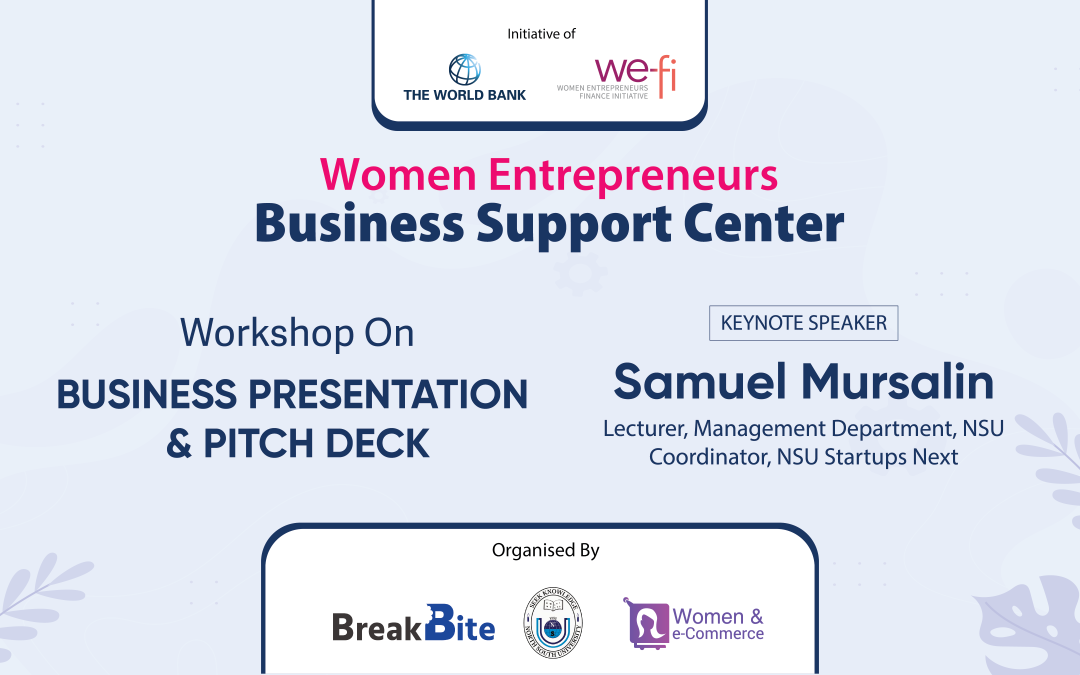
by BreakBite Editorial Wing | Mar 6, 2024 | WSME Business Insights
The Women Entrepreneurs Business Support Center, a key initiative under the We-Fi project of the World Bank and organized by BreakBite in collaboration with North South University, successfully conducted its third workshop focused on Business Presentation and Pitch Deck on March 6, 2024. The workshop, led by Mr. Samuel Mursalin, faculty member from the Management Department at North South University and Coordinator of NSU Startups Next, provided invaluable insights into crafting effective pitch decks tailored to different audiences.
The workshop aimed to equip women entrepreneurs with the skills necessary to create compelling pitch decks that effectively communicate their business ideas and strategies to potential investors, partners, and stakeholders. Mr. Mursalin emphasized the importance of storytelling, market analysis, and business model considerations in creating a successful pitch deck.
Key Highlights of the Workshop:
1. Crafting an Effective Pitch Deck: Mr. Mursalin began by discussing the key components of an effective pitch deck. He highlighted the importance of having a clear and concise structure, with each slide serving a specific purpose. The recommended number of slides and their content were discussed in detail, with practical examples provided to illustrate best practices.
2. Storytelling Content: The workshop delved into the art of storytelling, which is essential for engaging the audience and making the pitch memorable. Mr. Mursalin explained how to craft a compelling narrative that includes:
- An engaging introduction
- Team building strength
- The unique solution provided by the business
- Product demand and market analysis
- Go-To-Market Strategy
- Business model considerations
3. Practical Examples: Participants were shown practical examples of successful pitch decks to help them understand the structure and content better. Mr. Mursalin provided detailed explanations on each example, highlighting what made them effective and how the attendees could apply similar techniques to their own presentations.
4. Q&A Session: The workshop included a long, interactive Q&A session where participants had the opportunity to ask specific questions about their pitch decks. Topics covered included how to answer investors’ questions, the right gesture, posture, and attitude required during the pitch, and strategies for making a strong impression. This session allowed for personalized guidance and helped address the unique concerns of each entrepreneur.
The workshop saw active participation from the attendees, who appreciated the practical advice and personalized feedback provided by Mr. Mursalin. The insights gained from this session are expected to significantly enhance the participants’ ability to create effective pitch decks, ultimately aiding in securing investment and advancing their business ventures.
Participant Feedback: The participants expressed their gratitude for the comprehensive and insightful workshop. They highlighted the value of learning from an experienced professional and the opportunity to engage in interactive discussions. The feedback was overwhelmingly positive, with many noting that the skills and knowledge gained would be instrumental in their entrepreneurial journeys.
The Women Entrepreneurs Business Support Center continues to empower women by offering valuable resources and insights through such interactive workshops. The center remains committed to supporting the growth and success of women-led SMEs by providing tailored support and expert guidance.
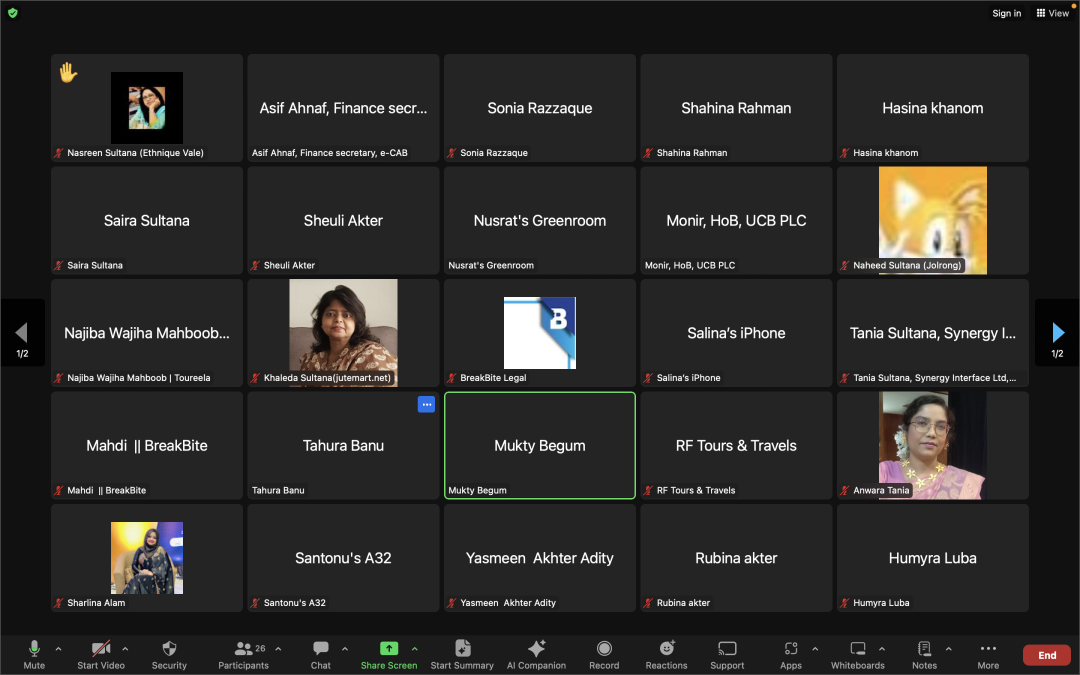
by BreakBite Editorial Wing | Feb 27, 2024 | WSME Business Insights
The Women Entrepreneurs Business Support Center, a key initiative under the We-Fi project of the World Bank and organized by BreakBite, successfully conducted an informative mentorship session on Business Finance and Loan Processing on February 27, 2024. The session featured esteemed specialists Mr. Monir Hossain, Senior Vice President and Mirpur Road Branch Head at UCB PLC, and Mr. Asif Ahnaf, Finance Secretary at e-CAB. The event saw the active participation of 37 women entrepreneurs eager to enhance their understanding of business finance and loan processing.
The webinar focused on a range of critical topics, including UCB’s alternative investment subsidy scheme, freelancing financial issues, spouse guarantor issues in pursuing loans from banks, export logistics, Islamic finance schemes, and e-CAB membership. The session provided a platform for participants to raise their questions and gain expert advice on various financial matters.
Key Discussion Points and Participant Queries:
- Nusrat:
- Queries: e-CAB membership, Mukti Fund – BB Women Financing Initiative, loan process, TAX submission issue, LTD, business canvas, spouse guarantor issues with Bangladesh Bank (BRPD)
- Hasina Khanom:
- Queries: Work order finance, freelancing-based finance issues, spouse guarantor issues, seeking contact with Mr. Monir Hossain for further guidance
- Najiba Wajiha Mahboob:
- Queries: e-CAB membership, freelancing-based finance issues, seeking further advice from Mr. Monir Hossain
- Mohsena Munna
- Queries: Islamic finance, profit-sharing models, equity-sharing models, financial and regulatory compliance documents
- Nasrin Akter Mila
- Queries: Export logistics, jute fiber business, 50% TT, Monash University research
- Farida Easmin NARI
- Queries: Export logistics, factory development
- Nazma Rahman Rozy
- Explored strategies for securing business loans and managing financial risks
Participant Feedback: Participants expressed their gratitude for the comprehensive and insightful session. They appreciated the opportunity to engage directly with experienced financial specialists and receive tailored advice for their unique business challenges. The session was highly productive, offering practical solutions and empowering women entrepreneurs with the knowledge to navigate financial complexities effectively.
The Women Entrepreneurs Business Support Center continues to empower women by providing essential resources and insights through such interactive sessions. The center remains committed to supporting the growth and success of women-led SMEs by providing tailored support and expert guidance.








